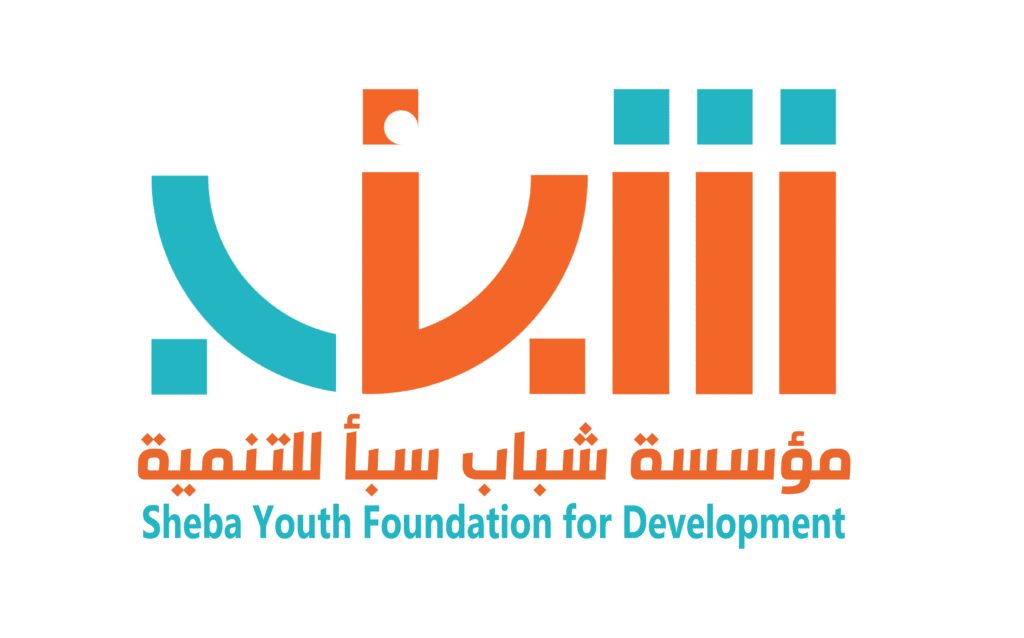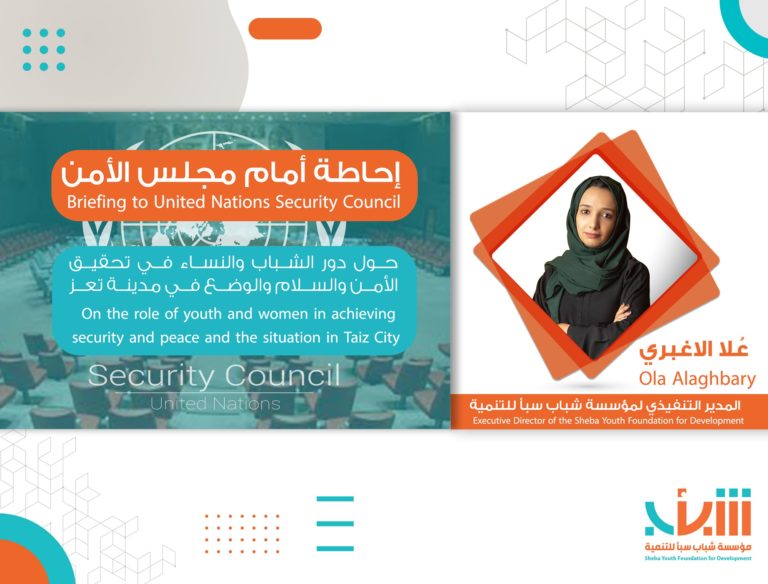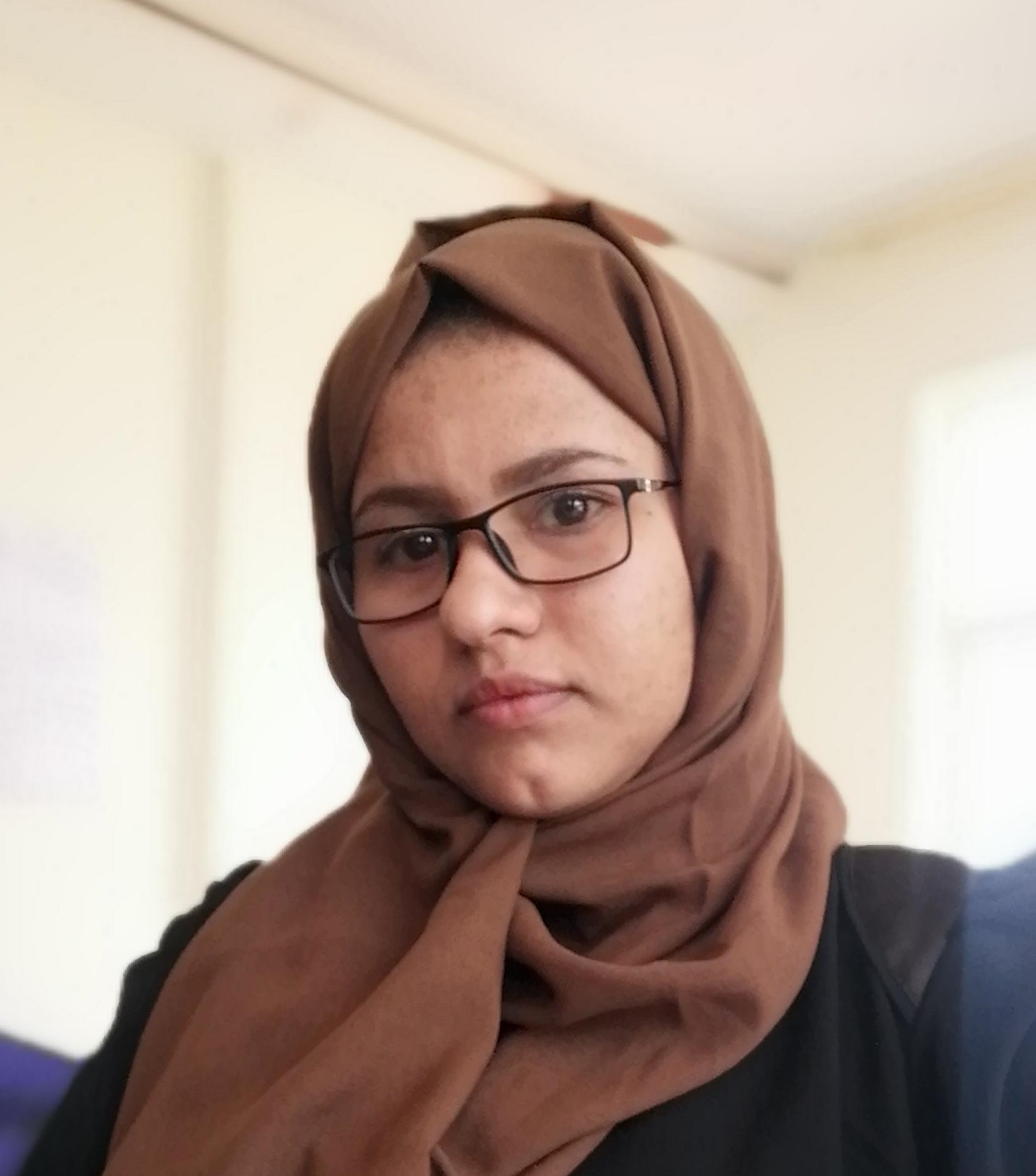Founding partner and CEO of Sheba Youth Foundation Ms. Ola Al-Aghbari briefed the Security Council on the role of youth and women in achieving security and peace and the situation in Taiz City.
The text of the briefing
,Madam President, Distinguished Members of the Council
At the beginning, I would like to thank the Government of Norway for giving me the opportunity to give this briefing on behalf of Sheba Youth Foundation for Development (Sheba), a local youth-led foundation through which I work with many young people and women in order to achieve security and peace in my country, Yemen, which has been afflicted by war for more than 7 years.
I am Ola Al-Aghbari, a young woman from Yemen, and like me are thousands of Yemeni youth and women who are on an unsecured land from shells and air strikes, but we insist on continuing and working every day to promote community coexistence and achieve peace and security in Yemen. I am here to give this briefing on the efforts of women and youth in the process of peacebuilding in Yemen and the situation in my city, Taiz, and about our efforts in the local mediation to make a difference in the lives of the local people whose suffering is on the rise while receiving no support or backing from any party.
,Madam President, Ladies and Gentlemen
Through Sheba Youth Foundation and due to our belief in the importance of the role of youth and women in resolving community conflicts, and due to the weak performance of the local authorities because of the war, we have formed community councils that work to resolve conflicts that occur among people on a daily basis. These youth councils have become important references for society in resolving conflicts and alleviating tensions..
But the role of youth is not limited to working only at the local level, but it also extends to hopes and aspirations to work at the national level and participate in the peace negotiations that are taking place between the parties to the armed war. Therefore, in this regard, Madam President, we have recently, in cooperation and partnership with a large number of youth organizations and coalitions from various regions in Yemen, launched the first youth support group, which aims primarily to push the voices of youth at the national level by lobbying for the formation of a youth advisory council that works with the office of the UN envoy to Yemen so that Youth’s visions can reach the negotiating tables; this work arises from our belief that peace negotiations on the Greater homeland should not be limited to the parties to the armed war, but it should also include non-armed groups such as youth, women and civil society.
These are the efforts made by youth and women every day on the ground, which if we stopped to make, the problems would have worsened more and more and we would have lost many of our friends and loved persons in the war. These efforts, which are not highlighted by the media only interested in the war and destruction in Yemen, prove that youth, women and civil society are able to participate in the peacebuilding process. Thus, they need your support and also the support of the international community to maximize their effects, and ,too, to be a step in the right path towards achieving Security Council resolutions, especially 1325 on Women, Peace and Security and 2250 on Youth, Peace and Security.
,Madam President, Ladies and Gentlemen
I am from Taiz City. I have traveled for longer than 120 kilometers for eight full hours on the road down to the south to reach you here so as to give this briefing. This trip would have taken less time had it not been for the closure of the main roads. I passed through bumpy roads and dangerous mountain paths that are constantly cut off either due to accidents of vehicles and heavy transport trucks, or because of torrential rains and rockslides in rainy seasons, all of which are accidents that often cause casualties among civilians.
As for the other road east of the city, many citizens in Taiz, before the war, used to travel through it from one side of the city to the other in a period no longer than ten minutes, but today this main road is closed and we now need at least six hours to arrive. Such alternative sub-roads have become real death journey paths for all those passing through them including the commercial convoys, humanitarian crews, travelers, patients, students and workers who work in facilities located at one edge of the city while reside at the other. So, this is what makes people’s lives dark and cruel, and adds more severe torments to their suffering, which turned Taiz into a repulsive environment coinciding with the exit of medical competencies and large capitals, and even international and local organizations that moved their centers of work to Sana’a and Aden and left this city to die more than seven years ago.
Until this moment, Taiz is still suffering from road closures, lack of services and neglect, which is the worst stage the city has gone through, and I stress here that despite this suffering that more than three million people endure every day, Taiz is off the spotlight. Politicians have paid no attention to it, nor has it been at negotiating tables, nor was it able to draw the conscience of the world to what is happening in it, despite addressing its case under the item “Understandings on Taiz” approved by the Security Council in Stockholm Agreement under Resolution 2451 of 2018.
,Madam President, Ladies and Gentlemen
Women, youth and civil society in Taiz City are making a lot of efforts to reopen the main roads closed due to the war and to reactivate basic public services. Women and youth have carried out several mediation campaigns to reopen roads since 2015. These campaigns required a lot of efforts, all of which were unfortunately unsuccessful in opening a safe road for civilians, especially for women, children and sick people; so people of my city keep living, for their seventh year, in a besieged city that literally lacks the basics of life.
Concerning the file of the provision of basic services, especially the provision of water service; we, as local male and female mediators, with the help of a coalition of local actors, have restored some wells that were under the control of military forces, which restored water service to some neighborhoods that have been deprived of it for seven years. And we are still mediating between the various parties to ensure the re-flow of water to citizens in the city, and so far we have seen that the parties have responded well to the efforts of the mediation team, and there is a clear willingness to cooperate to find solutions. If this mediation succeeds in restoring the flow of water to citizens, it will be one of the most important successes of the civil society since the outbreak of this protracted war.
Again, I very well appreciate this invitation to brief the Security Council, and as a person coming from the ground, I emphasize that our efforts as youth, women and civil society will not stop in the process of achieving stability and peacebuilding, and here I would like to share with you and the international actors a set of recommendations that support our efforts and work in the field:
1. Stressing the active participation of youth, women and civil society organizations that express the interests of the vast majority of Yemenis in peacebuilding mechanisms through the formation of a Civil Society Support Room and a Youth Advisory Council to consult and coordinate with the office of the UN Secretary-General’s envoy to Yemen.
2. Working with and increasing support for youth-and women-led civil society organizations, and building their capacities with genuine empowerment programs so they can effectively participate in the process of peacebuilding.
3. Focusing on supporting young women, for this group is not clearly and tangibly included in the group of male youth, nor in the group of women to whom international support is currently directed.
4. Directing support for the convening of the “Understandings on Taiz” committee, which is one of the outcomes of Stockholm Agreement in 2018, to include civil society working in mediation to reopen the main roads for citizens in Taiz City.
5. The presence of a focal point between the local mediators and the office of the UN envoy to Yemen.
,Madam President
I hope that Taiz, with its humanitarian and political dimensions, will be present on the agenda of international actors in the future, as they can add inputs to resolving the Yemeni crisis file. I stress the importance of supporting our role as youth, women and civil society in the process of achieving security and stability in Yemen.
…Thanks





